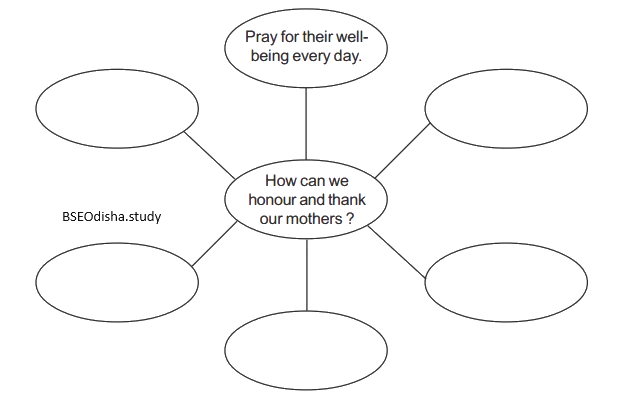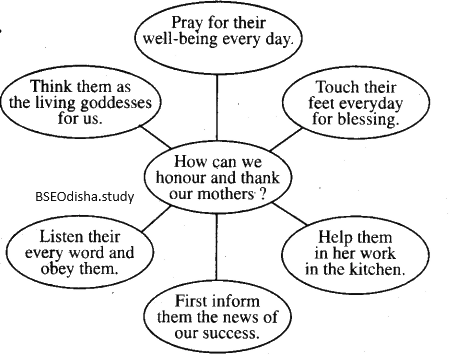10th Class English - Chapter 5 Village Song All Question With Answer
↓ Question & Answer ↓
1.) The poem appears to be a conversation between two persons. Who are they?
Answer: The conversation is between a mother and a daughter.
2.) Where does the “honey child” go?
Answer: “Honey child” wants to go to the wild forest.
3.) Why should she leave the mother and grieve the lover?
Answer: The girl wants to go to the wild forest because she is attracted towards it. She finds life in the wild forest far more interesting than getting married.
4.) How does the child describe the “wild forest”?
Answer: The child is very much attracted by the wild forest. She describes that it has champa and its buds are blowing. There are birds that chirp and there is lotus that is shining. There are fairy folks who are singing and attracting her.
5.) What does the expression ‘the world full of pleasure” mean?
Answer: ‘The world full of pleasure’ means that the life after marriage will be beautiful for the girl. She will have all the materialistic pleasures which she wants.
6.) What is common about bridal songs and cradle songs?
Answer: Both the bridal songs and cradle songs describes the heavenly pleasures of life. It is described as sandal-scented life which means life which is beautiful and has pleasures.
7.) How does the poet describe happiness and sorrow?
Answer: The laughter of the sun to-day, the wind of death to-morrow- this line is used in the poem to show happiness and sorrow. This lines implies that nothing is permanent in life, today’s happiness may not be the same next day.
8.) How does the poet compare forest notes with bridal songs and cradle songs?
Answer: The poet feels that there is rise and fall of sorrowness in the bridal and cradle songs. There is no permanent state in both the songs, whereas she feels that forest notes are more sweeter and have deep impact on the minds.
1.) The first four lines of the poem pose four questions. What does the mother want to tell her daughter?
Answer: The first stanza is full of questions. The mother asks her daughter where she was going. She asks her whether she is going to cast her beautiful jewelry and go away. She then asks her whether she is going to leave her mother all alone who took so much effort to raise her. Finally she asks her if she really wants to cry her husband-to-be and leave. In these four questions, the mother is persuading daughter to stay and get married. She, just like any mother, wants her daughter to be happy and settled.
2.) Does the mother’s appeal have any effect on the girl? What does the girl find irresistible?
Answer: The girl is least affected by the mother’s appeal. She is completed taken away by the charm of the wild forest and its beautiful things. She finds beauty in the lotus that shines brightly, the koil that chirps. She finds charm in the champa buds that blows.
3.) How are the worldly pleasures compared with the pleasures of the fairy land?
Answer: Worldly pleasures have no permanency. Today’s pleasure is replaced with tomorrow’s sorrow. On the other hand, fairy land is far more beautiful and has everything filled with certain beauty. Worldly pleasures have end at some point but fairy land’s pleasure has no end.
Question 1.
How many times does the word “would” occur in the poem?
(କବିତାରେ“would” ଶବ୍ଦଟି କେତେ ଥର ଅଛି ?)
Answer:
The word ‘would’ occurs three times in the poem.
Question 2.
How many questions are asked in the poem? Who – the mother or the daughter – asks the questions?
(କବିତାରେ କେତୋଟି ପ୍ରଶ୍ନ ପଚରାଯାଇଛି ? କିଏ – ମା’ ଅଥବା ଝିଅ – ପ୍ରଶ୍ନ ପଚାରିଛନ୍ତି ?)
Answer:
Five questions are asked in the poem. The mother asks the questions.
Question 3.
The adjective “bridal” is used in the following expressions : “bridal songs”, “bridal robes” and “bridal cakes”. Can you use the adjective in any other expression ? (“bridal” ବିଶେଷଣଟି ନିମ୍ନଲିଖ୍ ଶବ୍ଦପୁଞ୍ଜ : “bridal songs”, “bridal robes” ଓ “bridal cakes”ରେ ବ୍ୟବହୃତ ହୋଇଛି । ଏହି ବିଶେଷଣଟିକୁ ତୁମେ ଅନ୍ୟ କୌଣସି ଶବ୍ଦପୁଞ୍ଜରେ ବ୍ୟବାର କରିପାରିବ କି ?)
Answer:
Other expressions are as follows — “bridal party”. “bridal gown”, “bridal suite”, “bridal shower”, “brida laughter”, and “bridal tears”.
Question 4.
In lines 3 and 4 of the first stanza the word “who” is used to qualify the nouns “mother” and “lover”. Use the word to qualify other nouns in sentences of your own.
(ପ୍ରଥମ ପଦର ୩ୟ ଓ ୪ର୍ଥ ଧାଡ଼ିରେ ‘“who” ଶବ୍ଦଟି “mother” ଓ “lover? ବିଶେଷ୍ୟକୁ ବିଶେଷିତ କରିବାକୁ ବ୍ୟବହୃତ ହୋଇଛି । ଶବ୍ଦଟିକୁ ଅନ୍ୟ ବିଶେଷ୍ୟକୁ ବିଶେଷିତ କରିବା ପାଇଁ ତୁମ ରଚିତ ବାକ୍ୟରେ ବ୍ୟବହାର କର ।)
Answer:
(i) This is the man who helps you.
(ii) My sister, who came home yesterday. is a university student.
(iii) Would you blame your father, who loves you?
(iv) Would you misbehave with the guests who come to your house?
Question 5.
Rearrange the following phrases in the sequence in which they occur in the poem. (ନିମ୍ନଲିଖ୍ ବାକ୍ୟାଶକୁ କବିତାରେ ଥିବା କ୍ରମରେ ସଜାଅ ।)
the Champa buds are blowing; bridal cakes are on the hearth,’ lotus hules glisten; Koil-haunted river isles; bridal robes are in the loom.
Answer:
The Champa buds are blowing, Koil-haunted river isles, lotus lilies glisten, bridal robes are in the loom, and bridal cakes are on the hearth.
Question 6.
Marks the rhyming words in each stanza. Find out the rhyming words ending in ‘ing’ form. Discuss with your friends how many are common and what effect they have on you when you read the poem alone.
(ପ୍ରତି ପଦର ଯତିପାତ ପଡ଼ିଥିବା ଶବ୍ଦଗୁଡ଼ିକୁ ଲକ୍ଷ୍ୟ କର । ‘ing’ ରୂପରେ ଥିବା ପଦଗୁଡ଼ିକୁ ଖୋଜି ବାହାର କର। କେତୋଟି ସାଧାରଣ ପଦ ଅଛି ଓ ସେଗୁଡ଼ିକ କବିତାଟିକୁ ପଢ଼ିଲାବେଳେ ତୁମ ଉପରେ କି ପ୍ରଭାବ ପକାଉଛି ତୁମ ସାଙ୍ଗମାନଙ୍କ ସହ ଆଲୋଚନା କର ।)
Answer:
Rhyming words ending in ‘ing’ form in the poem are
1st line — going
2nd line — blowing
5th line — going
6th line — blowing
11th line — glowing
12th line — going
15th line — falling
16th line — calling
Two pairs are common in the above rhyming.
1st line – Whither are you going?
5th line – To the wild forest, I am going.
2nd line – The breezes are blowing.
6th line – The Champa buds are blowing.
1 st line is a question and 5th line is its answer.
In the 2nd and 6th lines both breezes and buds are blowing.
Someone said, ‘God couldn’t be everywhere, so He created mothers’.
Work in groups of three or four and discuss what we can do to honor and thank our mothers.
When you finish your discussion, your teacher will collect the opinions of the different groups and create a web chart like this :
(କେହି ଜଣେ କହିଥିଲେ, ‘ଈଶ୍ୱର ସବୁଠାରେ ରହିପାରିବେ ନାହିଁ, ତେଣୁ ସେ ମା’ମାନଙ୍କୁ ସୃଷ୍ଟି କରିଥିଲେ । ତିନିଜଣିଆ ବା ଚାରିଜଣିଆ ଦଳରେ କାର୍ଯ୍ୟ କର ଏବଂ ଆମେ ମା’ଙ୍କୁ ସମ୍ମାନ ଓ ଧନ୍ୟବାଦ ଦେବା ପାଇଁ କ’ଣ କରିପାରିବା ଆଲୋଚନା କର । ତୁମର ଆଲୋଚନା ସରିବା ପରେ ତୁମର ଶିକ୍ଷକ ବିଭିନ୍ନ ଦଳର ମତାମତ ସଂଗ୍ରହ କରିବେ ଓ ଏହିପରି ଏକ ବୃତ୍ତୀୟ ନକ୍ସା ପ୍ରସ୍ତୁତ କରିବେ ।)

Answer:

1.) How does the mother dissuade the girl from going to the forest?
(ଜଙ୍ଗଲକୁ ଯିବାରୁ ମା’ ଝିଅକୁ କିପରି ନିବର୍ତ୍ତାଇଛନ୍ତି ?)
Answer: The mother persuades the girl not to go to the wild forest and marry. She wants her daughter to settle down and enjoy the worldly pleasures of life. The mother tells her daughter about the positive things of the married life. She tells her that there is much pleasure in married life and there are songs of pleasure. Bridal songs and the cradle songs are the most beautiful songs in a woman’s life. She finds pleasure is such things. She reminds the daughter of her responsibility towards her husband-to-be. The mother tells her bridal jewellery is shining and her robes are all set.
Question 2.
Why does the girl want to go there?
(ଝିଅଟି ସେଠାକୁ ଯିବାକୁ କାହିଁକି ଇଚ୍ଛା କରିଛି ?)
Answer:
The girl, in the poem, is a staunch lover of nature. She is completely averse to worldly pleasures. She does not prefer a married life. She wants to go to the wild forest. She shall be delighted to see the branches with beautiful buds in the Champa trees. She wants to enjoy the sweet songs of the Koils as well as the beauty of lotuses and lilies in the river island of the forest. The sweet voices of the fairy folk are calling her. Further bridal songs and cradle songs which depict worldly pleasures have cadences of sorrow. The happiness of today is followed by the sorrow of tomorrow. So she is disgusted with this kind of unnatural pleasures of life. To her, the music of nature is far sweeter than bridal songs and cradle songs. So she decides to go to the wild forest.
Question 3.
Given below is a table. Write in the table the words/expressions from the poem that you think are appropriate in each column. (ନିମ୍ନରେ ଏକ ସାରଣୀ ଦିଆଯାଇଛି । ପ୍ରତ୍ୟେକ ସ୍ତମ୍ଭ ପାଇଁ ତୁମେ ଭାବୁଥିବା କବିତାର ଉପଯୁକ୍ତ ଶବ୍ଦ|ଶବ୍ଦପୁଞ୍ଜଗୁଡ଼ିକୁ ସାରଣୀରେ ଲେଖ ।)
| Worldly pleasures | Worldly pleasures |
Answer:
| Worldly pleasures (ସାଂସାରିକ ସୁଖ) | Pleasure in Nature (ପ୍ରକୃତିରେ ଆନନ୍ଦ) |
| wearing jewels (ଅଳଙ୍କାର ପିନ୍ଧିବା |)
golden grain wedding (ବିବାହ) bridal songs (ବିଭାଘର ଗୀତ) cradle songs (ନାମାବାୟା ଗୀତ) bridal-robes (ବର-ଅଳଙ୍କାର) sandal-scented leisure hearth bridal cakes lullabies (ଲୁଲେବିଜ୍) |
breezes
wild forest champa trees with boughs champa buds (ଚମ୍ପା କଳିକା) koil haunted river-isles fairy folk forest-notes forest-streams (ଅରଣ୍ୟ-ସ୍ରୋତ) shining lotus (ପଦ୍ମ) lilies (ଲିଲି) |
Question 4.
Now prepare a note on the atmosphere of fairyland as described in the poem.
(କବିତାରେ ବର୍ଣ୍ଣିତ ହୋଇଥିବା ଭଳି ପରୀରାଇଜର ପରିବେଶ ସମ୍ପର୍କରେ ଏକ ଟିପ୍ପଣୀ ପ୍ରସ୍ତୁତ କର ।)
Answer:
The fairyland here refers to the wild forest where the music of nature attracts everyone. The blowing of Champa buds upon the Champa branches, songs of singing birds, and shining of lotus and lilies in the river islands add to the beauty of the fairyland. The flowing of streams and the voices of the fairy folk are also important lectures of the fairyland.